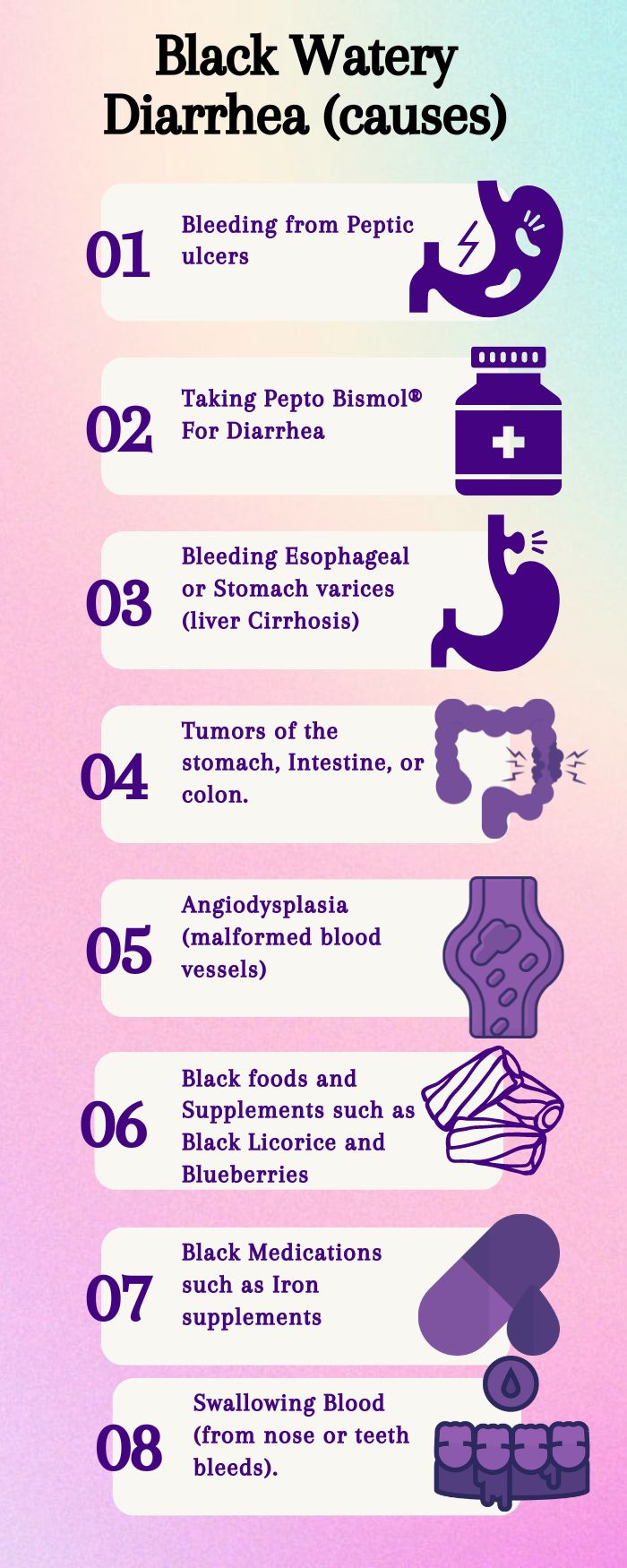Black Watery Diarrhea: 5 Causes & When To Worry.
Our content is not intended nor recommended as a substitute for medical advice by your doctor. Use for informational purposes only.
Quick Insights: What You Need To Know.
- Black watery diarrhea is a potentially serious condition that may reflect bleeding inside the gut tract.
- Common causes of black watery diarrhea include
- Peptic ulcer bleeding.
- Taking Pepto Bismol for diarrhea.
- Bleeding esophageal or gastric varices.
- Bleeding from tumors or malignant ulcers inside your gut.
- Angiodysplasia: bleeding from malformed blood vessels.
- Black foods such as blueberries and black licorice.
- Black medications such as iron supplements, Pepto Bismol, and activated charcoal.
- Swallowing of blood from nose or tooth bleed.
- It is important to pay attention to the amount of black color in the diarrhea, as this may reflect the severity of the bleeding.
- Symptoms of gastrointestinal tumors vary depending on the type and the side of the tumor, and the condition is usually diagnosed by taking a biopsy of the bleeding lesion.
- Patients taking blood-thinning medications may experience bleeding from multiple sites of the body and should seek medical help immediately if they experience black watery diarrhea.
- Malformed blood vessels in the stomach or intestine can lead to sudden massive bleeding, which in turn can cause black watery diarrhea.
- Eating black foods or taking black medications can also cause black watery diarrhea, as well as the swallowing of blood.

How does black watery diarrhea happen?
Why black?
- Digested blood: Bleeding inside your stomach or the upper part of your small intestine usually turns black before it passes into the stool.
- **Black Medications:** Most common medications that cause black stools are Bismuth subsalicylates (Pepto Bismol) and Iron-containing medications.
- Black food: such as Black licorice, blueberries, grape juice, chocolate sandwich cookies, beets (ref).
Any lesion inside your stomach or intestine, such as ulcers and/or malformed blood vessels or swallowing of blood (common in people with epistaxis, bleeding inside the oral cavity, or post-tonsillectomy bleeding).
Why watery diarrhea?
We are talking today about “black” and “watery diarrhea” and not “black stool”. So, what can cause both watery diarrhea and black stool?
Possible causes include:
- Massive bleeding inside your gut: the larger the blood inside the gut tract, the more like it causes loose black stool up to watery diarrhea.From my own professional experience (I deal with multiple patients with bleeding esophageal and fundal varices daily), the more severe the stomach bleeding, the more likely the bowel movements become black and watery.
- Bismuth subsalicylates (Pepto Bismol) treatment for diarrhea: Pepto Bismol is commonly used for diarrhea so that it may turn your existing watery diarrhea into black.
- Just an association: such as eating black stool while you have a gut bug or an attack of IBS-diarrhea.
3 VITAL questions to ask yourself about “black watery diarrhea”?
1- How much “black” is your diarrhea?
From my experience dealing with hundreds of patients complaining of “black diarrhea,”. A majority of them refer to the “dark” as “black”.
So, the first thing to ensure is the color of your diarrhea before diving into the causes below.
“Dark brown” or “dark green” stools are different from black stools. So, notice the stool under sufficient light to ensure it is true black.
2- What is the amount of black diarrhea?
Black stool is a potentially serious condition that may reflect bleeding inside your gut tract. The amount of black diarrhea may reflect the “severity” of the bleeding. If you have sudden massive black watery diarrhea, consult your health care provider immediately.
3- Do you have any “red flag” signs?
Black watery diarrhea due to bleeding inside your gut is life-threatening; seek medical help if you have any signs or symptoms below.
- Sudden onset of a massive amount of black watery diarrhea.
- Presence of red or clotted blood with black watery diarrhea.
- Vomiting of blood.
- Severe epigastric pain (pain in the upper central part of your abdomen.
- Shortness of blood, sweating, rapid heartbeats.
- Dizziness, confusion, fainting attacks, or loss of consciousness.
- Being on medications that cause blood thinking, especially warfarin and new oral anticoagulants.
- Having a previous history of bleeding peptic ulcer or bleeding esophageal and gastric varices.
- Liver cell failure (chronic liver failure or liver cirrhosis may lead to bleeding from esophageal or gastric varices).
Common causes of watery black diarrhea:
1- Peptic ulcer Bleeding.
Peptic ulcer refers to a breakdown in the lining of your stomach or duodenum, which can bleed and cause black watery diarrhea in severe cases.
People usually have peptic ulcers due to the abuse of “Non-Steroidal Anti-Inflammatory Drugs” or H. Pylori infection.
In the United States, up to 73% of patients with Peptic ulcer disease (PUD) suffer from bleeding ulcers (causing vomiting of blood or black watery diarrhea) (ref).
How to suspect Peptic Ulcers (as a cause of black watery diarrhea).
- History of recurrent epigastric pain or you are known to have peptic ulcer disease.
- The pain is in your middle or upper stomach and occurs as burning or gnawing, usually exaggerated by food.
- Heartburn, nausea, and vomiting also occur.
- Pain is relieved by antacids or anti-ulcer medications.
- History of the cause, such as taking Non-steroidal anti-inflammatory drugs or having Helicobacter Pylori infection.
How to deal if you suspect a Peptic ulcer as a cause of black watery diarrhea?
- A bleeding peptic ulcer is a life-threatening, emergency condition.
- If you suspect peptic ulcer bleeding (or are unsure about the cause of black and watery diarrhea), you must seek emergency medical help as soon as possible.
- Typically, people with bleeding peptic ulcers will undergo an emergency endoscopic examination of their esophagus, stomach, and duodenum.
- The endoscopist usually can control bleeding by the endoscopy, but most patients will require blood transfusion and anti-ulcer medications.
2- Pepto Bismol.
The active ingredient of Pepto-Bismol is called bismuth subsalicylate. it is used to treat:
- Diarrhea.
- Heartburn
- Nausea
- gas and indigestion.
- Bloating.
- Also, it is used in some cases of H. Pylori stomach infection.
Pepto-Bismol turns black inside your body. And it is common for people taking Pepto-Bismol to experience black stool and even a black tongue.
Black diarrhea starting after taking Pepto-Bismol is common, and you don’t have to worry.
If you took Pepto-Bismol for watery diarrhea, watery diarrhea could turn black after being yellow or brown.
If you are unsure, please consult your doctor or nurse.
MORE: Pepto Bismol (Bismuth Subsalicylates) OTC: Review & Drug Profile.
3- Esophageal or gastric varices.
Sudden black watery diarrhea in patients with chronic liver diseases (especially liver cirrhosis) usually indicates bleeding varices.
A varix is a dilated vessel in the wall of your esophagus (esophageal varix) or stomach (gastric varix). it is caused by failure of the liver to properly receive blood from your digestive tract, A condition called “portal hypertension”.
How to suspect bleeding varices:
- Vomiting of blood (usually large amounts).
- Black stool, black diarrhea, or tarry stool.
- Signs of the cause (liver disease) such as jaundice, distension of the abdomen (ascites), and swelling of the lower limbs (lower limb edema).
- Lightheadedness.
- Lost consciousness in severe cases.
The condition is not confined to liver cirrhosis; other causes that can cause variceal bleeding include:
- Blood clot (thrombosis) in the main vein of the liver (called the portal vein).
- Parasitic infection with schistosomiasis can cause similar conditions by damaging the liver.
- Rare vascular diseases of the liver, such as Bud-Chiari syndrome.
How to deal if you suspect bleeding esophageal varices:
As with any bleeding inside your digestive tract, you must seek emergency medical help. Time is critical, especially if you experience both vomiting of blood and black stool.
4- Taking medications that cause blood thinning.
Another overlooked cause of gastrointestinal bleeding is medications that cause blood thinning.
Over-dosing or the wrong combination of the blood-thinning medication with other medication (such as antibiotics) without medical supervision can lead to bleeding.
Common blood-thinning drugs that can cause bleeding:
- Warfarin (Coumadin, Jantoven)
- Enoxaparin (Lovenox).
- Dabigatran (Pradaxa).
- Apixaban (Eliquis).
- Rivaroxaban (Xarelto).
- Heparin.
Any misuse of the above medications can result in bleeding from multiple sites of your body such as:
- Bruising under the skin: bluish patches under the skin of your limbs or trunk.
- Bleeding inside your gastrointestinal tract leads to vomiting blood or black stools.
- Bleeding inside urinary tract: leading to red urine.
- Bleeding per nose: leading to epistaxis.
- Bleeding inside your mouth: usually from gums.
- And more seriously, bleeding inside or around the brain (Intra-cerebral or extra-cerebral Hemorrhage).
So, having black watery diarrhea while taking one of the blood-thinning medications mentioned above may indicate bleeding inside your gut.
The black watery diarrhea is more likely due to these medications if you experience bleeding from other sites, such as under the skin, mouth, nose, …etc.
Get immediate help from your doctor if you experience black watery diarrhea while taking a blood-thinning medication.
5- Bleeding Esophageal, Gastric, or intestinal cancers.
Benign or malignant masses (tumors) inside your gastrointestinal tract can easily bleed.
This is more common with malignant forms such as cancer stomach or cancer esophagus. The mass usually ulcerates and causes bleeding, leading to black diarrhea in severe cases of massive bleeding.
The symptoms of gastrointestinal tumors vary according to the type and the side of the tumors, for example:
- Difficulty in swallowing, chest pain, coughing, hoarseness, or heartburn with esophageal cancer.
- Epigastric pain, fullness after eating small amounts, nausea, weight loss, and indigestion with stomach cancer.
- Changes in bowel habits, abdominal pain with colon cancers.
The condition is usually diagnosed by taking a biopsy of the bleeding lesion. Bleeding from gastric or intestinal cancer is considered more in older ages.
6- Malformed blood vessels in the stomach or intestine (Angiodysplasia).
In rare cases, you may experience bleeding from abnormal “malformed” blood vessels inside your stomach or intestine.
The Problem with this type of bleeding is it almost has no symptoms. It presents with sudden massive bleeding, which in turn can cause black watery diarrhea and loss of large amounts of blood.
Blood loss can range from mild undetectable bleeding to massive life-threatening blood loss with black to red stools.
7- Diarrhea after eating black foods or medications.
Coincidences happen. You may get diarrhea at the same time you are eating black foods that causes blackish stools. And the result is “black watery stool.”
Diarrhea can happen due to:
- A stomach bug or stomach virus (gastroenteritis).
- An attack of IBS with diarrhea.
- Food intolerance
- celiac disease, or any other causes of chronic or acute diarrhea.
Black foods that can cause blackish stool include:
- Blueberries.
- Black licorice.
- Black sausage.
Black medications:
- Pepto-Bismol.
- Iron pills.
- Activated charcoal.
8- Swallowing of blood.
Another case we frequently see in our practice is swallowing blood coming from the nose, mouth, or throat.
People with massive epistaxis or severe flooding per gum or mouth for any cause may swallow a large amount of blood.
This blood passes into the stool and turns its color black. Having black stool or black diarrhea after one or two days after an epistaxis attack (ref), tooth bleeding, or bleeding after a tonsillectomy operation may be a result of swallowed blood.
- Evidence-based
- Written by a doctor.

Related Posts:
- Bright Yellow Watery Diarrhea: 6 Causes Simplified…
- Yellow Watery Stool: Common Causes And Treatments.
- When to worry about ALT levels? Gastroenterologist Explains.
- 5 Causes of Lower Abdominal Pain When Coughing &…
- Stomach Pain after Emptying the Bladder: Causes…
- Clear Urine with Bubbles: 6 Main Causes & When to Worry





